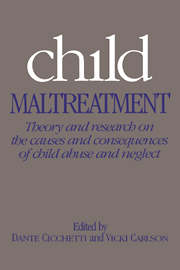Book contents
- Frontmatter
- Contents
- List of contributors
- Preface
- Part I History and definition
- Part II Parental and contextual influences on maltreatment
- Part III The developmental consequences of child maltreatment
- 13 How research on child maltreatment has informed the study of child development: perspectives from developmental psychopathology
- 14 Child maltreatment and attachment theory
- 15 Patterns of maternal behavior among infants at risk for abuse: relations with infant attachment behavior and infant development at 12 months of age
- 16 Finding order in disorganization: lessons from research on maltreated infants' attachments to their caregivers
- 17 Peer relations in maltreated children
- 18 The effects of maltreatment on development during early childhood: recent studies and their theoretical, clinical, and policy implications
- 19 Social cognition in maltreated children
- 20 The effects of maltreatment on the development of young children
- 21 Troubled youth, troubled families: the dynamics of adolescent maltreatment
- 22 Child abuse, delinquency, and violent criminality
- 23 The prevention of maltreatment
- Name index
- Subject index
18 - The effects of maltreatment on development during early childhood: recent studies and their theoretical, clinical, and policy implications
Published online by Cambridge University Press: 04 May 2010
- Frontmatter
- Contents
- List of contributors
- Preface
- Part I History and definition
- Part II Parental and contextual influences on maltreatment
- Part III The developmental consequences of child maltreatment
- 13 How research on child maltreatment has informed the study of child development: perspectives from developmental psychopathology
- 14 Child maltreatment and attachment theory
- 15 Patterns of maternal behavior among infants at risk for abuse: relations with infant attachment behavior and infant development at 12 months of age
- 16 Finding order in disorganization: lessons from research on maltreated infants' attachments to their caregivers
- 17 Peer relations in maltreated children
- 18 The effects of maltreatment on development during early childhood: recent studies and their theoretical, clinical, and policy implications
- 19 Social cognition in maltreated children
- 20 The effects of maltreatment on the development of young children
- 21 Troubled youth, troubled families: the dynamics of adolescent maltreatment
- 22 Child abuse, delinquency, and violent criminality
- 23 The prevention of maltreatment
- Name index
- Subject index
Summary
Introduction
In several recent reports, we have presented initial results of studies of the socioemotional development and behavioral symptomatology of maltreated preschool and early school-age children (Aber and Allen, 1987; Aber, Allen, and Cicchetti, 1988; Aber, Trickett, Carlson, and Cicchetti, 1989; Cicchetti, Carlson, Braunwald, and Aber, 1987). The purposes of this chapter are to summarize the results of these studies and to discuss their implications for a variety of unresolved scientific, clinical, and policy issues. In order to accomplish these purposes, it is first necessary to briefly describe the theoretical, clinical, and policy contexts in which these studies were designed and conducted.
Contexts for the research
Scientific theoretical context
As we have noted elsewhere (Aber and Allen, 1987; Aber and Cicchetti, 1984; Cicchetti et al., 1987), until very recently, the few scientific studies of the effects of maltreatment were largely atheoretical. In our opinion, atheo-retical research in child maltreatment is only slightly better than no research at all. This is because no single study or set of studies will provide us with all the knowledge necessary to guide our clinical and policy efforts on behalf of maltreated children. Rather, it is by developing accurate, comprehensive theories of the etiologies of child maltreatment and the development of maltreated children that cumulative knowledge may serve as the basis for effective actions.
Thus, a central issue at the very start of our studies was the selection of the general and specific theoretical frameworks within which we could conduct our studies. Although rarely commented upon, the selection of theoretical frameworks within a scientific world of multiple and competing paradigms is a critical stage of scientific research.
- Type
- Chapter
- Information
- Child MaltreatmentTheory and Research on the Causes and Consequences of Child Abuse and Neglect, pp. 579 - 619Publisher: Cambridge University PressPrint publication year: 1989
- 64
- Cited by



